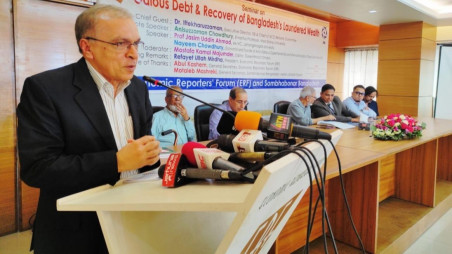Fair election not possible if any govt acts with bias: Iftekharuzzaman
According to him, three types of groups operate within the administration: one strongly influenced by political parties, another partially influenced, and a small professional group trying to remain neutral.

Fair elections cannot be ensured if any government overseeing the polls acts with bias, Transparency International Bangladesh (TIB) Executive Director Iftekharuzzaman said today (19 September).
"No country can expect a fair election if the government is partial and fails to ensure a level playing field," he said at the inauguration of an election training programme organised by TIB and the Reporters Forum for Election and Democracy (RFED) in Dhanmondi, Dhaka.
Iftekharuzzaman said Bangladesh's governance, rule of law, institutional transparency, accountability and integrity have been undermined, not only over the past 16 years but over the last 54 years.
"Political control has weakened every institution, creating professional bankruptcy. Restructuring this in a year or two is not feasible," he added.

He questioned whether the current administration and law enforcement agencies could realistically deliver a free and fair vote, noting that political influence remains embedded in the bureaucracy. He said that reinstating positions for individuals previously deprived by the former government is also a form of politicisation.
According to Iftekharuzzaman, three types of groups operate within the administration: one strongly influenced by political parties, another partially influenced, and a small professional group trying to remain neutral. "Some officials are striving for neutrality amidst these competing forces," he said.
Discussing other election stakeholders, Iftekharuzzaman said that every participant is important, with the Election Commission holding a central role legally and constitutionally. "The question is how effectively the commission has performed its responsibilities," he said.
Political parties are also pivotal stakeholders. He warned that while parties publicly claim to support free, neutral, and participatory elections, their underlying goal of winning can compromise fairness. "If their condition is 'I will contest only if I win,' ensuring a free and fair election becomes extremely difficult."
He said it is important that candidates adhere to laws, rules, and codes of conduct, noting that misuse of state power by parties is detrimental to a fair vote.
He noted that voters, election observers, and the media must all contribute to a neutral environment.
He added that journalists must observe and report on the government's role during elections, as failure to uphold neutrality undermines the electoral process. "Journalists need to reflect on whether they are fulfilling their professional responsibilities and conduct self-assessment," he said.
The TIB chief also raised concerns about new rules requiring journalists to inform authorities before entering polling centres, calling it a potential tool for harassment.
He urged the removal of such barriers, saying, "Journalists must report neutrally, based on facts, and continue to demand transparency; only then can a fair and neutral election be possible."
He reminded journalists that reporting on the enforcement of laws, protection of voter rights, and exposure of failures is both a constitutional and legal duty.



 Keep updated, follow The Business Standard's Google news channel
Keep updated, follow The Business Standard's Google news channel


















